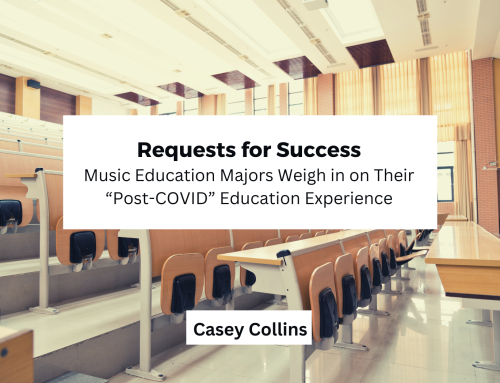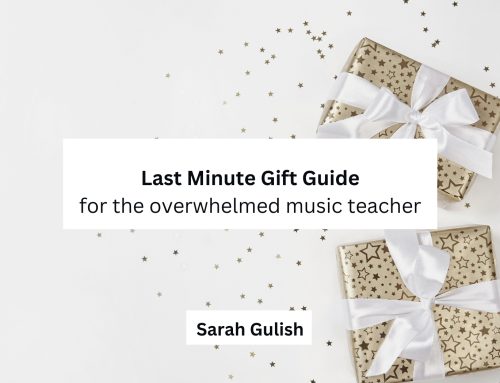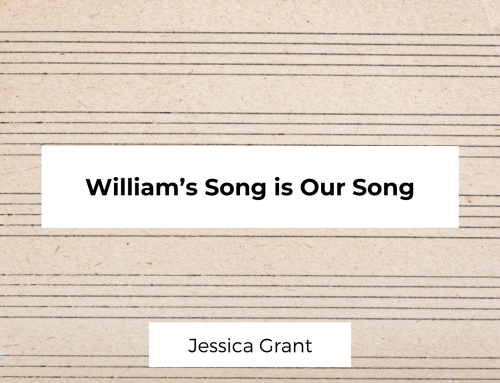Self-Care is More Than Finding Your “Why”
I was speaking with a student teacher about experiencing burnout symptoms and why finding their preferred self-care practices is important. In our discussion, I had mentioned that the most commonly stated piece of advice (whether given as real advice or delivered with an eye roll) is to remember your “why.” Our discussion was helpful, but I realized that the field of teaching can be just as rewarding as it is prickly.
And to prepare for future conversations with other stressed-out student teachers or in-service teachers, I wanted to provide real strategies aside from simply what worked for me personally. So, I looked for an article.
Self-Care Practices of K-12 Teachers
When speaking about why anyone in teaching needs to focus on self-care, I often describe the sheer number of decisions made each day and how much of ourselves we give to our students and communities. Dr. Kelley and his research team described music teacher roles as requiring a delicate balance between life as a “teacher, musician, mentor, and advocate” in addition to maintaining any personal commitments.
That’s a lot. As I’m sure many of you understand and can empathize with.
For this quantitative study, Jamey Kelley and his co-authors surveyed 337 K-12 music teachers and asked about their personal and professional self-care practices. They conducted a pilot survey, which “tested out” survey questions to ensure that what they were asking and how they were asking it allowed them to answer what they were curious about: what the reported self-care practices were and if there were variations in those practices based on teaching experience, gender, age, or the grades they teach.
The survey sent out to the 337 K-12 music teachers consisted of 28 questions that were based on existing surveys. If you’re curious about the questions, check out the supplemental materials to see the survey questions AND results!
What They Found
One of the more commonly reported personal and professional self-care practices was maintaining social relationships. Formal and informal social opportunities, professional networking, and mentoring can be particularly helpful in preventing you from feeling isolated.
The least commonly reported personal self-care practice on the survey was physical activity. This led Dr. Kelley and his research team to consider that the participants did not have an ideal work-life balance and may be choosing to spend more time at work instead of eating healthy, getting enough sleep, or moving their bodies.
Although the research team was interested in if there were differences in personal and professional self-care practices for participants due to teaching experience, gender, age, or the grades they teach, there were no significant differences. The research team stated in their discussion that they felt there may have been differences had they investigated racial identity, income, or relationship status. This is likely an entire rabbit hole to wander down, and if you feel inclined…explore away (and let me know what you find).
Note: The reason I find research so interesting is because of the questions one study brings up for me. I tell my music education research methods students that reading research leads me to add more to my TBR list and list of research studies to consider.
You have been sufficiently warned.
So What? Why Should You Care?
Reading this article reminded me of my own dissertation research about itinerant teachers. My participants who enjoyed their jobs felt they found opportunities to speak with colleagues and protected their time with loved ones and/or family. Humans are social beings, and social connections can be a “key contributing factor to happiness.” Check out Social Connection: A Key to Happiness for some tips from Dr. Ashley Smith (a licensed clinical psychologist of Peak Mind).
I often say that I need to figure out how and when to be social and not social. One of the things I found when looking at isolation research was that social isolation exists along a continuum from self-selected isolation (aka the “me time” with my coffee before my classes) to loneliness (aka being excluded intentionally or unintentionally). Some people require little social interactions, while others crave it…which is a fancy way of saying some people are introverted and others are extroverted.
However, regardless of where you fall on the continuum, you do need to be social in some way. Sometimes when my social battery is on “E,” I move to be in a place less people-y. Other times, I leave a conversation feeling better than when I started it. Everyone has their ideal balance, and you have to figure out what that balance looks like for yourself.
You are a human who requires regular socialization, watering, feeding, and activity (both mental and physical). Christian Bernhard recently wrote a book about managing stress as a music teacher, and if you haven’t read it yet, I highly encourage you to do so. It is a short, quick, and worthwhile read!
Learning how to manage your stress and what types of self-care practices help you is key to ensuring that you find an ideal work-life balance and are satisfied with your job. And ideally, when your job satisfaction isn’t where you want it to be, you can better identify what doesn’t feel good about it so you can make a change.
Moving Forward
This study really highlighted that, in a world where teaching is what it is, understanding well-being for pre-service teachers and teachers who have been in the field for any amount of time is a conversation worth having. Especially now when the world of teaching is SO different than before Covid-19 shut down everything.
I was listening to a Podcast a bit ago and was directed to a book called Upstream. The book suggests that rather than dealing with issues as they come up, it can be easier to address things further “upstream.” I think this idea really works when you think about the conversation with teacher well-being and self-care.
If burnout and leaving the profession are the result of complex issues and stress over a long period of time…why not find ways to better manage stressors before they become thoughts, feelings, or ideas that are too big to unpack on your own? I really resonated with Dr. Kelley and the research team when they suggested that teachers can serve as models for demonstrating “purposeful self-care” by embracing the “values of self-care over self-sacrifice.”
It isn’t just about “finding your why,” as many professional development sessions talk about—but instead finding your stress management practices preventing the symptoms from requiring you to focus on why you show up for your students each day. Go a bit upstream from the stress related to long days at work and focus on what you need as a human to thrive.
Because at the end of the day, we are people who choose to be teachers. And while teaching may feel like your whole world, to do this job, you first have to take care of everything that makes you YOU.
Look into whether your school district offers discounts and take advantage of the ones that are exciting to you. Take the long way back to your classroom and say hello to someone. Go for a walk and enjoy the sunshine (or buy yourself a sun-lamp and soak in that artificial sunshine). Reach out to a friend you haven’t talked to in a while. Plan for a night out with someone or a group. Treat yo self to something you want but don’t need. Download the Calm app and use it yourself and/or with your students. Which, by the way, did you know that educators get a free download? If not, now you do!
Long story short, treat yourself with care. And I’ll give you the same advice I gave to a student teacher AND former student teacher out in the field: if something isn’t working for you, control what you can. If you try to give too much of yourself to your job (or future job), you may find that there’s not enough social, emotional, or physical energy left for you to function.
Take care of your whole body and treat it with the same care you want for the people you love. Even though it can be hard to remember in the moment, you deserve to take care of all of what makes you, you. And not all of you is a teacher…even when it feels like being a teacher is who we are, and not just what we are.
Do you have research to contribute to this column? Submit with this link so that I can share what you’ve created in a future column.
If you are interested in reading more about how to read and understand music education research, check out my book!




Leave A Comment